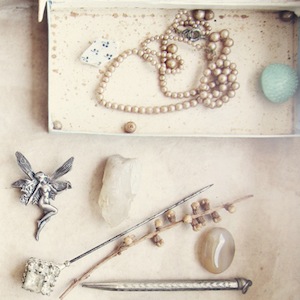Stolen Family Jewels, and Other Gifts

A few years ago a woman stole several pieces of sentimental jewelry from our house. My husband’s gold baby bracelets from India, and a thick gold chain, a gift from his grandparents. It was the necklace he wore every day the summer we met, when I could think of nothing but him, the necklace laying sensually on his deeply tanned, half-Indian summertime skin. From me, the thief took my Bubby’s wedding bands, and a thin gold bowtie pin my beloved Papa had given my grandmother, Gam, early in their marriage. Gone was a necklace given to me by my in-laws for the birth of my second son, with a blue sapphire pendant marking his birth stone, and the bracelet gifted to me when my first son was born following a labor that haunted me while I nursed him to sleep each night his first year of life.
I never told Bubby, my only living grandparent, that her wedding bands were gone. Of her seven grandchildren, she had chosen me to keep those rings.
We noticed the missing jewelry in stages throughout the course of an early summer day, although my husband had been asking after his necklace for several days before we had any suspicion that it might be gone. I had ordered a new jewelry box the week before, catering to an abstract feeling that I was not keeping track of my things. When the new box arrived in the mail, I spread a dark towel on the floor, and my two young sons helped me lay everything out. I showed them the tiny card Gam sent when she passed on the bowtie pin to me, but then we couldn’t find the pin. I looked on the floor, under the towel, and under my boys. A bit later, my husband asked if I had found his necklace. The next things we noticed missing were the baby bracelets. And so on. It took four missing pieces of jewelry before we understood that something had happened.
Since no one had broken into our house, the police named the whole foggy experience a robbery. They sent me to the detective overseeing their pawn unit. Incredibly, while searching for an unusually spelled first name of someone who had been in our house, the detective read aloud to me the names of other people with pawn shop records whose first names alphabetically came close. That list revealed not the person I knew had been in our house, but another uncommon name that caught my attention. The detective read me the last name: a neighbor’s nanny, who I instantly remembered being in our house several times. Her pawn shop sales behavior suggested criminal activity. Next came an awkward phone call with our neighbors who then discovered their own missing precious heirlooms. In time, we learned she stole from many to support her daughter’s drug addiction.
We never got our jewelry back. I never told Bubby, my only living grandparent, that her wedding bands were gone. Of her seven grandchildren, she had chosen me to keep those rings; although not the oldest, I was the first of the seven to marry.
Six months after our jewelry disappeared, my mother was hit by an SUV and killed in Washington, DC. She had the right of way in a crosswalk on Connecticut Avenue near the zoo, and there is no acceptable way to explain how a car could have hit her with the force to kill given the intersection, weather, traffic, and even the most cursory display of human attention. She was one day younger than 65. There was no piecing together of anything, no clues then revelation. She was gone in an instant, and the loss was immediate and stunning.
People told me that everything my mom had to give me she had already shared during her lifetime, that she lived on inside of me through her teachings and love. This is what I spoke of at her memorial service, projecting those feelings of sadness, gratitude and remorse.
Yet after her death, I found myself wanting what was on the outside, to hoard the physical things. My stepfather continues to live in the apartment they shared and is surrounded by her every day, but she left her personal property to my sister and to me. Each trip to DC following her death was an opportunity for me to delicately (for my stepfather’s sake) claim her things for my own. The week she died, I packed an outdoor iron planter shaped like a rooster, and took her hair conditioner. Weeks later, after the memorial service, I stacked into a soft duffel bag the tattered hardcover Little House on the Prairie books from her childhood and mine. Time would pass, and I would call my stepfather to schedule another visit, thinking about what was hers and now mine, and wanting those things with me, on my shelves, in my kitchen, for my kids. I wanted as many of her things as possible, and mourned everything that wasn’t mine to take from his apartment.
Months after my mother’s death, we did a first pass through her closet. I packed a large suitcase with her shoes slightly too small for me, and her clothes slightly too big. When I got home, I put away her handbags, hung up her clothes, arranged her shoes, and stored her scarves; within minutes, my closet smelled just like her, and my sons walked in and out, bringing her back to their senses. The next day, it smelled just like her. The day after that her smell was gone.
These physical things, the things we are told are insignificant in the face of love and company and laughter and intellect, they matter to me. Losing our family’s few jewelry links to the past, then gaining back some of my mother’s personal property, have shown me how I grasp at the things I can hold and touch to feel ongoingly those who are now beyond my touch forever. I get pleasure from putting on a pair of my mom’s shoes, much more so than looking at a photograph of her. With those shoes in hand, or painfully on my feet, I imagine how beautiful she must have felt wearing them, how delighted she might have been when she first saw them, the care she took putting them in her closet at the end of a day at work.
The day my mom was cremated was an endlessly endured state of total distraction. I pictured her body in a desolate cement chimney, surrounded by heat so intense it suddenly explodes into fire, her dry hair crackling, engulfed in flames. My mind fought between unfathomable imagery and required stoicism, the violence of heat and fire revealing a simple mound of quiet ash. Throughout the day I wondered, Was she still here with us: the body of a beautiful woman, those freckled arms, those high arched feet, those thin lips?
When we finally released my mother’s ashes into the dark waters of her beloved childhood lake, my younger son pulled to his chest the tweed bag that had carried the ashes to this destination, and he sobbed, caressing the empty bag and holding onto whatever he thought he was holding. My mind couldn’t work like that. I watched them replaced by surface lake water, yet could not connect the ashes to the person. Instead, I connect with her through her things, the things she surrounded herself with in life.
As time passes, I regret even more that I no longer have Bubby’s wedding bands, the rings that she chose to represent her marriage, that she saw every time she moved her hand, that she likely contemplated during a union to a man who had carried on a double life with another woman who might have worn other wedding bands, inherited by other grandchildren. Her pain and joy, a lifetime with a partner, were entrenched in these bands, and I can only imagine them now as melted down gold, awaiting a destiny disconnected from our shared past.
I want Gam’s thin gold pin to pass on to one of my sons. It captures in some way, the feelings my Gam and Papa shared for each other when they were young and the next generations were not yet part of their intimacy. My sweet sons, barely known to this past young couple who one day grew very old and loved their great grandsons deeply during the time their generations crossed: when they are men, I want them to think about how their existence links back to this, small gestures, gifts to a lover.
When I need to feel close to her, I wear the ring my mother was wearing when she was killed. It is missing a tiny stone dislodged when she hit the pavement. I study the ring and wonder whether certain scratches in the gold are also the result of the accident. Feeling the weight of the ring on my small finger, remembering when she bought it (a gift for herself) and imagining those last unbelievable seconds of her life—these matter to me.
My mom is gone, but my imagination reaches out to her, yearning to be with her at that lonely and shocking moment of death. I want to put my arms around her and experience what she experienced, be with her so that she is not alone. In sorrow and empathy I seek her out, studying with my eyes and feeling with my skin the heavy circle of this ornate and beaten band on my finger, scratches and beauty and all.










